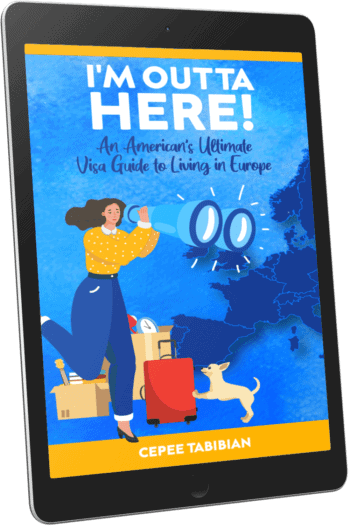Moving to Spain from the US
When you daydream about living in Spain what’s comes to mind? Is it visions of sun-kissed cities and coastlines, tantalizing tapas, the warm embrace of Spanish culture, or its rich and fascinating history?
More and more people are moving to Spain every year. If you ask you’ll quickly see that the reasons for moving to Spain from the US are more than just sunshine and tapas. Americans are drawn by the promise of a better lifestyle, lower living costs, and a safer environment compared to the U.S. Plus, affordable healthcare is a game-changer. Spain’s got it all–the charm, safety, and costs that won’t break the bank.
Not that you need more convincing but there are a few more reasons to consider moving to Spain. Roughly the size of Texas, Spain has 17 diverse regions. From Mediterranean coastal towns to bustling Madrid, the options for a move abroad are vast.
Spain’s laid-back atmosphere and vibrant social scenes attract Americans, whether they’re students, English teachers, freelancers, or retirees. Many have found their perfect spot, and you could too. Ready to delve into the details of making your dream move from the US to Spain a reality? Keep reading!
How hard is it to move to Spain from the US?
This is the right question to be asking. Currently, around 40,000 US citizens live in Spain. While you can visit for 90 days within a 180-day period on a tourist visa, living in Spain requires a visa. Fortunately, there are various long-term visa options for Americans. We’ll dive into them in the next section.
Another path to settling in Spain is to obtain Spanish citizenship. Eligibility includes having a parent or grandparent born in Spain or citizenship from certain countries like those in Latin America, the Philippines, or being born in Puerto Rico, providing a potential fast-track to Spanish citizenship.
Visas for Spain
Spain has quite a few visa options for Americans who want to immigrate to Spain, making your Spanish dream more possible than you think. If you’re ready to make your move these are your visa options:
Student visa: A student visa allows you to live in Spain for the duration of your studies, either by enrolling at a university or certain approved language academies. Many U.S. citizens come to Spain on a student visa as a language assistant to teach English (no teaching experience required). The program not only provide a visa but also a monthly stipend and private health insurance.
Work visa: A work visa is extremely difficult for Americans to obtain but if you’re lucky enough to land a job offer and visa sponsorship from a Spanish company, this might be your ticket in to living in Spain!
Entrepreneur visa: This visa is for entrepreneurs who want to launch a startup in Spain.
Non-lucrative visa: This visa allows you to live in Spain as long as you aren’t seeking work and have proof of financial means to support yourself. This is a popular option among U.S. citizens.
Freelance visa: This option is for freelancers and self-employed individuals who want to work in Spain or set up their own business.
Digital nomad visa: This visa is for remote workers, freelancers and 1099 employees—not W2 employees—who want to take their remote job with them to Spain.
For more detailed information about these visas, their requirements and how to apply, get your copy of I’m Outta Here! An American’s Ultimate Visa Guide to Living in Europe. In this digital book you’ll find everything you need to know about the aforementioned visas as well as 50+ other visa options for the 18 easiest countries to move to in Europe for Americans!
Move to Spain on a digital nomad visa
Spain digital nomad visa was officially approved and signed into law in December 2022. As a new law, it still faces some challenges, meaning not everything is perfectly clear yet. Broadly speaking, the digital nomad visa allows people from non-EU countries to live in Spain and work remotely.
This is the best option for US citizens who work remotely, specifically those who have already established a fully-online freelance business. You might be wondering…”What if I’m not a freelancer? I have a remote job as a W2 employee! Can I do this too?”
The answer is…it’s complicated. There are currently limitations on the ways you can use this visa if you aren’t a freelancer, which you can read about more in our in-depth guide to Spain’s digital nomad visa.
The best places to live in Spain as an American
Location, weather, population, access to public transportation, and expat communities are some factors to consider when thinking about relocating to Spain. To guide you in discovering your perfect place take a look at our ultimate guide of the 12 best places to live in Spain. Below we’ve summarized a selection of the top spots in Spain for Americans seeking a new life abroad.
Madrid: Spain’s capital and largest city, is a cultural mecca that attracts people from all over the world. Some highlights that draw Americans to live in Madrid include the active social communities, excellent transportation system, climate, and central location to other parts of the country. Learn more about living in Madrid.
Barcelona: Aside from being on the coast, people love Barcelona’s weather, architecture, (think Gaudi and Sagrada de Familia), as well as access to northern Spain and southern France. If you’re considering moving here, be aware that Catalan is the main language spoken among locals, although most people also speak Spanish. It’s also important to note that with the massive influx of tourists and foreigners, non-locals may feel less welcomed compared to other cities in the country.

Valencia: A coastal city that is the third largest city in Spain. It’s quickly become a hot destination for digital nomads, families, and retirees. Compared to Madrid and Barcelona, Valencia’s cost of living is significantly lower. The city’s relaxed vibe, year-round sunshine, easy beach access, and friendly people, make Valencia one of the best places to live in Spain as an American.
Sevilla: In addition to being the capital of Andalusia, Sevilla is a small city with a lot of history. Along with being in the most affordable region of Spain, Sevilla is known as the second cheapest city in both the country and Europe. For those who want to fully immerse into Spanish culture and love the heat – Sevilla has your name on it!
Malaga: Located along the southern coast, Malaga is an appealing place for Americans who want a true Spanish experience with an international flair. The weather also draws retirees seeking to live in a warm climate that’s on the water. Because there are so many expats from different parts of the world living in parts of Malaga, it’s easy to get by on speaking Spanglish. Learn more about living in Malaga.
How much money do you need to live in Spain?
The amount of money you need to live in Spain really depends on you. It will vary based on your individual preferences, lifestyle, and spending habits. What we can say is that Spain offers a more affordable lifestyle compared to the US, yet, like many places worldwide, daily expenses are on the rise, particularly in housing. Rental prices have surged by over 20% in some Spanish regions in the past year alone.
Now let’s give you a general idea of the cost of living in key Spanish cities compared to the United States. In major cities like Madrid or Barcelona you can expect an average monthly rent of €850 to €1600 for a one-bedroom apartment in or near the city center. Smaller cities around the country might be up to 40% less.

Much of Spain’s food, wine, and oil is home-grown or locally-produced, which makes grocery bills very affordable. An individual can spend a little as €40 a week. Dining out is also much more budget-friendly than the US—you can easily get dinner for two plus wine for under €50.
We always advice to crunch the numbers before moving abroad. Understanding what your costs will be based on your priorities—like proximity to the sea or apartment amenities—will guide you in budgeting for your new life abroad
How to find a place to rent in Spain
Before starting your search for a place to live, think about how you envision your life in Spain. For instance, if you’re a social person who doesn’t like to live alone, consider getting a roommate. If you’re someone who prefers privacy, then your own apartment is the way to go. Here are some resources to help you find your future home:
- Idealista is commonly used by locals and expats to find a room, apartment or home through an owner or realtor.
- Spainhouses.net posts long-term rentals listed by owners and realtor companies.
- Networking is the way to go if you’re looking for a specific place, potential roommates, or seeking a realtor recommendation. In this case, join the Facebook communities in the city you want to move to and get renting insight from other members in the group.
Aside from using a realtor, there are numerous relocation companies with housing services in Spain. Keep in mind that these businesses usually charge an agency fee. It’s also best to see your apartment in person before you sign a contract. Additionally, you can arrange temporary housing and then decide where you’d like to permanently live once you’ve arrived.
Can Americans buy property in Spain?
The Golden Visa is a property buying option for foreigners who want to move to Spain and can afford a 500,000€ investment. This options also affords you a resident visa in Spain giving you the right to live and work in Spain.
Aside from taking the Golden Visa route, Americans may purchase property in Spain if they have a Foreign ID Number (called an NIE). However, the type of NIE will depend on if the buyer is a resident or non-resident of Spain. You will need to apply for your NIE from Spain.
Like the United States, buying property in Spain is an extensive process that includes getting contracts notarized and securing financing. You’re also required to register your future home with the Property Registry. For details about buying property in Spain, visit the Balcell’s Group.
How to move to Spain and work
While it’s not unheard of, it’s difficult for American’s to find work in the country because companies are required to prioritize hiring citizens of the EU. But, if you have a skill that can’t be filled by someone locally, it may be possible to get a work visa through company sponsorship.
If you’d like a part-time teaching gig, check out the teach English in Spain government programs. In addition to getting health insurance, you’ll receive a monthly salary of €1,000 in Madrid and €700 in other regions.
Many U.S. citizens in Spain opt for remote work. This is a win-win as you can still be paid in dollars and live well in Spain. Spain’s digital nomad visa is paving the way to help more Americans move to Spain and bring their remote job with them. Be sure to check out I’m Outta Here! An American’s Ultimate Guide to Living in Europe for other ways US citizens can work and live in Spain.

Do U.S. citizens pay taxes in Spain?
It depends. American citizens may have to file and pay taxes in Spain depending on the number of days in the country, visa and residency status, as well as their work status and if they own property in Spain. For example, if you own property and spend less than 183 days a year in Spain, you’ll still be required to pay a non-resident tax. Regardless of your residency status, you’ll also need to pay an annual wealth tax based on the value of your assets.
Contact the Balcells Group for help determining the type(s) and amount of taxes you may be required to pay.
Is healthcare in Spain free?
Spain’s public health insurance is available to those that pay into the country’s social security. So while you don’t have to pay out of pocket to see a doctor you are paying for healthcare through your taxes. However, Americans moving to Spain must purchase a private health insurance plan that has no deductibles and covers repatriation.
Expect to pay at least half, (and in many cases much less than that), of what you’re charged for health insurance in the States and receive some of the best care in the world! For more information on healthcare and private healthcare providers in Spain for Americans check out I’m Outta Here! An American’s Ultimate Guide to Living in Europe.
How to meet people as an American living in Spain
There’s far from a shortage of fun ways to create your own community when you arrive in Spain. For starters, if you’d like to improve your Spanish, enroll in a language school. Along with being a great way to practice your skills, it’s a comfortable setting for connecting with others.

Some other ways to find your peeps include attending Meetup events, joining Facebook Groups with in-person activities, and volunteering. You can also get a dog and easily make friends when you walk your pup every day! For more ideas about how to build your community in Spain, take a look at making friends abroad after 30.
Living in Spain as an American: How She Hit Refresh’s founder was able to make Spain work for her
While getting a visa and making your dream of living in Spain may seem overwhelming, you’ll soon realize that it’s very doable. So, get ready to be inspired as you learn how Cepee, founder of She Hit Refresh, has made it happen.
Back in 2006 (and again in 2015), Cepee moved to Spain from Texas on a student visa through the North American Cultural and Language Assistant program. Cepee saw her first experience as a teaching assistant as an opportunity to experience Spain. When she returned nine years later, her goal was to use her time on a student visa as a foot in the door to Spain that would allow her to find another way to stay in the country once she was there.
Cepee’s luck paid off and in 2016, she received a work visa from a Spanish startup that hired her. Since she was a native English speaker, held a master’s degree from a reputable Spanish university, and already lived in Spain, she was considered the best candidate for the role.
When Cepee moved on from her position at the Spanish startup, she was able to switch over to a non-lucrative visa. This gave her flexibility and time to focus on growing She Hit Refresh. In 2022 she became a Spanish citizen through her Latin heritage.
Like Cepee, you too have options about how you’re going to start your life in Spain. For more stories about Refreshers who’ve made their dreams come true and inspiration on how you can make it happen too, take a listen to our podcast and hear from She Hit Refresh members who made the move from the U.S. to Spain:
Ready to move to Spain?
Now that you’ve gone through all the FAQ about moving to Spain, are you ready start planning your own move? For even more insight on Spain take a look at our 20 pros and cons of living in Spain as an American.
If you want more information on how to move abroad, check out our resources:
- Sign up for the next Move Abroad After 30 Masterclass to see if a move abroad is a possibility for you!
- Join our Facebook group for women age 30 and up who want to move abroad
- Grab your copy of our Ultimate Visa Guide to Living in Europe as an American
All information included in this piece is based on most recent information available at time of writing – December 2023.




1 thought on “Moving to Spain from the US: Your FAQs Answered”
Thanks good info. I wish only that people would stop calling american immigrants ‘expats’. It’s silly, if you are considering leaving for good then you are an ‘immigrant’ just like any people coming into the US, legally or illegally, for good.